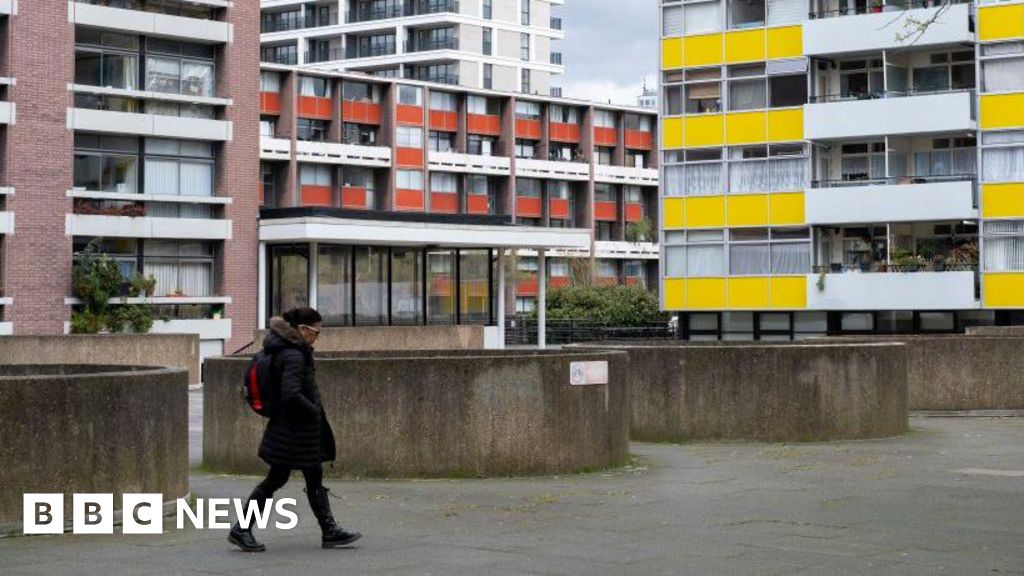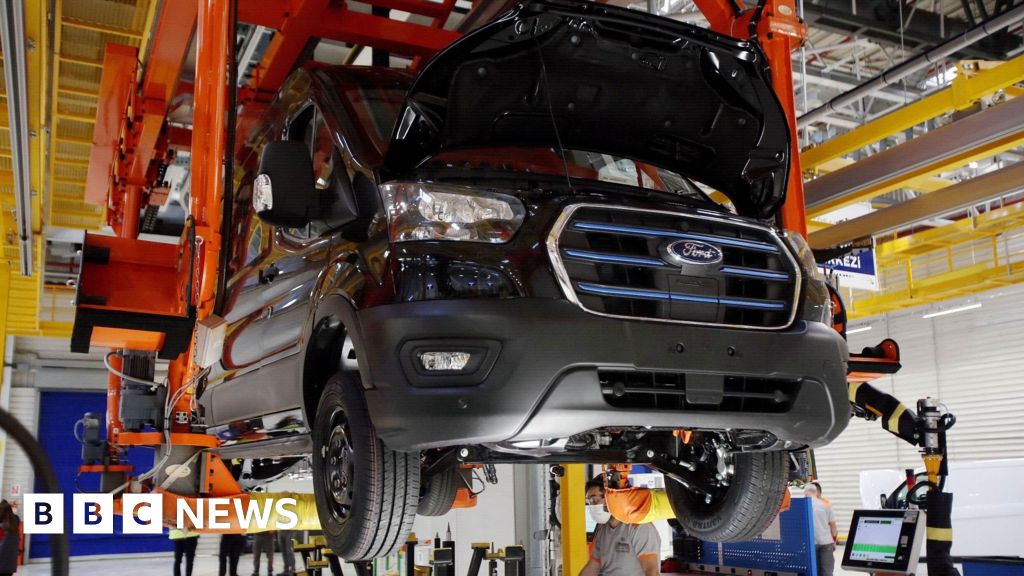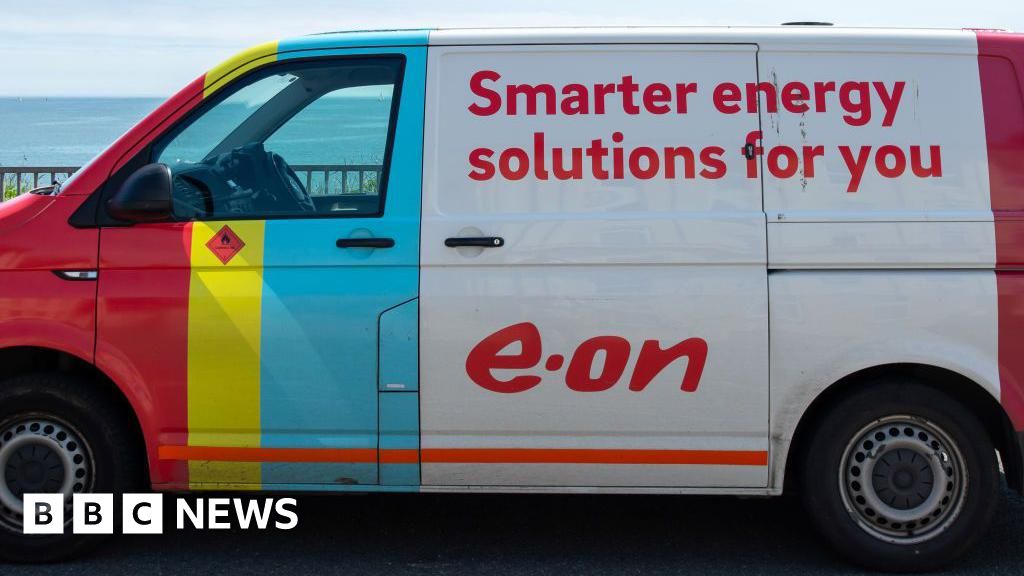Just now
By Colletta Smith, Cost of Living correspondent

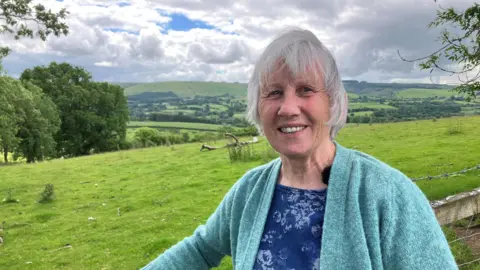 BBC
BBC
Dina Smith is worried about what future generations will say about pylons in Wales' green valleys
From the end of Dina Smith’s driveway, there is green as far as the eye can see. Sunlight touches the rolling hills and moorland peaks.
"Just look at it," she says as we take it all in. "This is beautiful, untouched Mid Wales."
But this could all change if plans for a huge wind turbine project get the go-ahead.
For Dina, the valley is a "really special place", where her, her daughters and their families live and where her grandfather grew up.

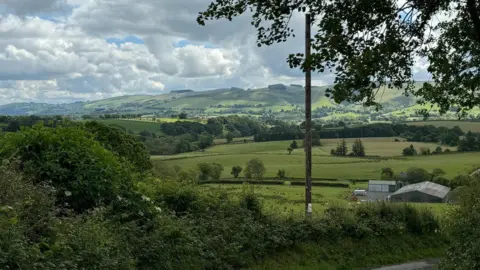
Towy Valley's view will drastically change as new energy policies take shape
In the run-up to the general election, she contacted the BBC through the Your Voice Your Vote portal with her concerns: "I just don’t want my grandchildren looking around this valley with industrial views of turbines and pylons and roads, and ask: 'What did you do about it nanna?'".
The Towy Usk project is being proposed by the renewable energy firm Green GEN Cymru and would take power from 31 giant turbines on a 60-mile pylon "pathway" spanning almost the width of Wales, in order to connect to the national grid.
Although it is the local council and Welsh government who grant planning permission, the reason the power lines have to run such a long way is that there are a limited number of points where big power projects can connect into the grid, which are controlled by UK government.
And whoever is in charge of the next government has an incredibly difficult task on their hands: Keeping energy bills low while millions are still struggling, ensuring energy security and hitting green energy targets.
Projects like this one in Wales are part of that mix.
But some local residents I have been speaking to have said the turbine construction would damage an existing forest, removing ancient trees along the pylon construction route.
"It’s destroying the environment in an attempt to save the environment" is the refrain that I keep hearing.
In recent years, there have been huge advances in the development of off-shore wind, and residents here want the focus of the UK and Welsh government on off-shore renewable technology instead.
But Abi Beck of RenewableUK Cymru says on-shore wind needs to remain part of the mix.
“On-shore wind is the cheapest, it’s the quickest to build and it’s the most readily deployable technology we have for renewable energy.
"And we desperately need to upscale the amount of renewable energy we produce if we are going to be anywhere near meeting our targets in the next decade", she said.
The difficulty here is that the place the on-shore wind is generated is a very long way from the place it can be plugged into the UK network.
Green GEN Cymru say they are listening to residents' concerns but that “the existing network in Mid and West Wales does not have nearly enough capacity to connect all the new renewable energy we need for our homes and businesses, locally and nationally."
Llandovery farmer Dyfan Walters knows that only too well. "We all know the infrastructure needs improving”, he says. "I’m not against renewable energy".
He and his wife Carys have just finished building their new family farm on the land that Carys grew up on. Now there are plans for two pylons in their fields so they’ve become members of the local Llandovery Pylon Steering Group.

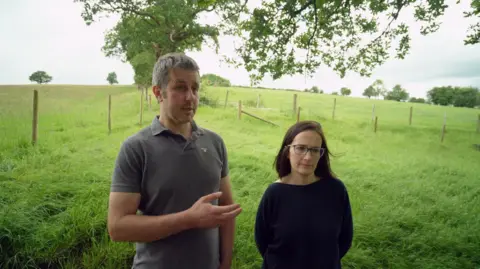
Two pylons are planned to be erected on Dylan and Carys Walters's farm
"This plan isn’t going to benefit anyone here in the Towy Valley," Dyfan says. "It’s to take energy to the grid which will be used by others".
As a result, Dyfan thinks Green GEN should use the latest technology to send the wires underground rather than use pylons, whatever the cost might be to the company.
That is the bind - those living in the valley feel they are being made to pay the price for green targets made more than 200 miles away in Westminster.
What are the parties promising on green energy?
Labour says it will work with the private sector to double on-shore wind, triple solar power and quadruple off-shore wind by 2030.
The Conservative party says in its manifesto that it will "ensure democratic consent for on-shore wind" and strike the right balance between energy security and the views of their local communities. It says it seeks to ensure local areas that host on-shore wind directly benefit, including potentially through energy bill discounts.
The Liberal Democrats say they will accelerate the deployment of renewable power and deliver energy security by removing restrictions on new solar and wind power.
Plaid Cymru says Wales should have full control over energy powers without any upper limit or conditions set by the UK government, and "that the beauty of Wales’ natural landscape should be preserved". It says that large-scale pylon developments or solar developments should be considered in the context of their impact and alternative methods for linking renewable energy to the national grid should be implemented, including through the undergrounding of cables.
Reform says that net zero is pushing up bills, damaging British industries like steel and making the UK less secure. It says the environment can be protected with more tree planting, more recycling and using less single-use plastics.
The Green party wants wind power to provide about 70% of the UK’s electricity by 2030.



 5 months ago
27
5 months ago
27




